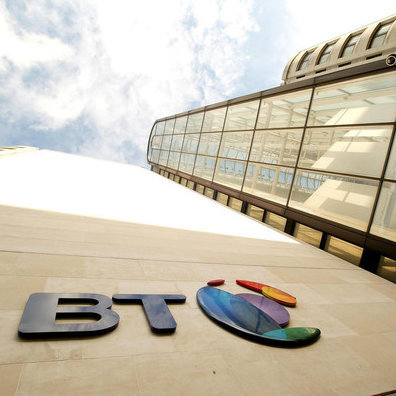UK telecom incumbent says job cuts are starting to support growth in earnings, but its sales performance remains dire outside the consumer business.

BT suffered a sales decline at every one of its major business units bar its consumer division during the first six months of its current fiscal year, but said 2,000 job cuts had buoyed earnings for that reporting period.
The struggling UK telecom incumbent reported a 2% fall in revenues, to about £11.59 billion (US$15 billion), compared with the year-earlier period. Adjusted earnings (before interest, tax, depreciation and amortization) were up 2%, to £3.68 billion ($4.75 billion), while net profit gained 30%, to nearly £1.1 billion ($1.4 billion).
BT Group plc (NYSE: BT; London: BTA) is just a few months into a program to cut about 13,000 back-office and mid-level management jobs as it tries to boost margins in the face of declining sales and growing competition. The company had about 105,800 employees on its books at the end of March. (See BT to Slash 8% of Jobs in Efficiency Drive.)
The update comes just a few days after BT confirmed that Worldpay boss Philip Jansen will become CEO in early 2019 when he replaces Gavin Patterson, who announced his departure earlier this year amid a shareholder backlash over his management of the company. (See Eurobites: Worldpay's Jansen Lands BT Top Job.)
Patterson's problems began in early 2017 with revelations of a costly accounting scandal at the Italian part of BT's global services division. Investors have also been disappointed with BT's weak performance and gloomy outlook in various corporate and public sector markets. (See BT Waves Goodbye to Gorgeous Gavin.)
While the consumer business has continued to report revenue growth, BT stopped providing details of customer numbers in its financial statements after witnessing customer losses at its TV business despite huge investments in sports content. Opponents accuse BT of using profits from its Openreach networks business to pay for TV rights.
Openreach provides network services to BT as well as other UK broadband retailers. Under pressure to improve conditions for BT's rivals, regulatory authorities have forced BT to manage Openreach as a "legally separate" entity, but it controversially remains a part of the BT Group. (See Only BT's Dismemberment Will Sate Rivals.)
The emergence of network competition in the form of CityFibre, a Goldman Sachs-backed infrastructure company building all-fiber networks for about 5 million UK homes, has further unsettled analysts. (See Eurobites: UK's CityFibre Announces $2.5B FTTH Investment Plan.)
"We remain uneasy with regard to the menace of competitive fiber build plans," said Robert Grindle, an analyst with Deutsche Bank, in a research note issued this week. "Openreach should attempt to scare off the alt-fiber phantom, before its glassy grip becomes unassailable."
Openreach has said it will extend all-fiber networks to as many as 10 million UK premises by the mid-2020s, but only if the conditions (regulatory and financial) are right. Its long-running concern is that UK telecom regulator Ofcom will force it to sell fiber connectivity to rivals at prices it deems unacceptably low.
Nevertheless, BT today claimed that Openreach is currently extending all-fiber networks to about 13,000 premises every week. Around 682,000 homes had been hooked up to all-fiber networks by the end of September, it said, while another 1.29 million have connectivity based on Gfast, a technology that boosts the signal strength over last-mile copper networks.
At its consumer business, the operator is now focused on selling a broader range of products to existing customers. Thanks to an increase in average spending per customer, sales were up 3% for the first six months of the fiscal year (April-to-September) to about £5.27 billion ($6.8 billion), compared with the year-earlier period.
Now entering its fifth year, the 2020 Vision Executive Summit is an exclusive meeting of global CSP executives focused on navigating the disruptive forces at work in telecom today. Join us in Lisbon on December 4-6 to meet with fellow experts as we define the future of next-gen communications and how to make it profitable.
But the performance in other areas was less admirable. The business and public sector unit recorded a 4% drop in revenues, to about £2.2 billion ($2.8 billion), while sales at the wholesale and ventures arm were down 8%, to £929 million ($1.2 billion). Revenues at global services fell 7%, to roughly £2.3 billion ($3 billion), and Openreach's sales dipped 1%, to about £2.47 billion ($3.2 billion).
While cost-saving efforts helped to lift earnings at global services and for the business and public sector unit, independent analyst Paolo Pescatore said these remained "worrying times" for BT.
"More turmoil awaits and the incoming CEO will have to make some tough decisions across the board and with all of BT's business segments," he said in emailed comments. "Despite its strong network assets, BT is struggling to stand out in a competitive landscape."
Pescatore said a new challenge for BT would be to make sure costs do not "spiral out of control due to the rollout of 5G and fiber broadband connections," and as it tries to renew and secure important sports rights.
BT, which includes mobile operator EE as part of its portfolio, is racing Vodafone UK to be the first UK operator to switch on next-generation 5G mobile services in 2019. Mansoor Hanif, Ofcom's chief technology officer (and formerly a senior executive at EE), told a conference in London this week that he expects to see the first commercial 5G services in September or October next year. (See BT Kicks Off 5G Campaign With Plans for 2019 Launch and Vodafone UK: We'll Be Ready to Launch 5G in Mid-2019.)
Patterson maintained BT's full-year financial guidance in the latest earnings statement but said he expects earnings to be at the upper end of its £7.3-7.4 billion ($9.4-9.6 billion) range.
— Iain Morris, International Editor, Light Reading
Read more about:
EuropeAbout the Author(s)
You May Also Like











